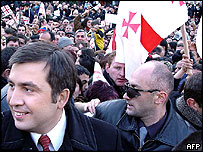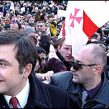
SAAKASHVILI: DEFIANT AND READY FOR ACTION
Publication: Eurasia Daily Monitor Volume: 4 Issue: 207
By:

Last Saturday evening, November 3, Georgian President Mikheil Saakashvili granted me a two-hour interview in his office, which is a few minutes’ walk from parliament. Demonstrators have been protesting in front of the building, demanding his resignation. On Friday, November 2, an estimated 50,000 protesters from all over Georgia gathered for the biggest rally since the 2003 Rose Revolution, which propelled Saakashvili into power.
The protest continued nonstop until today, November 7, although the numbers have decreased significantly. The protest was noisy, but generally peaceful, even though there were drunken teens in the crowd. Police cordoned off a large section of Tbilisi’s main Rustaveli Avenue and closed it to traffic. The police seemed good humored and deployed without riot gear, but still ready for action.
The anti-government protest in Tbilisi has echoes of the Rose Revolution. However, opposition leader Georgy Khaindrava, a former minister in Saakashvili’s government, told me during the protest rally in front of parliament, “There will be no revolutions—we will beat them at the polls.” Saakashvili also plans to stay in power by wining elections, but he has refused the opposition demand to have an early parliamentary vote next spring (see EDM, November 5).
Saakashvili has not been impressed by the opposition’s show of strength. “There are less of them out there and the protest may titter out,” he told me. This week Tbilisi’s typical winter weather has arrived, wet, cold, and windy, turning nonstop street demonstrating into a daunting prospect. In any case Saakashvili has the will and the resources to use force if needed to contain the opposition. This morning, police pushed out some 100 protesters and cleared Rustaveli Avenue in front of parliament. Excessive force apparently was not used, but Khaindrava was reportedly arrested (Itar-Tass, November 7).
According to Saakashvili, “The latest polls show 40% support and the closest opposition party has only 10. If elections were held tomorrow, we could take up to 65% of seats in parliament.” Still Saakashvili refuses to allow a snap national election to solve the crisis, as the opposition is demanding. “Our people must learn that elections are held on time,” he explained.
Saakashvili acknowledged there are problems related to unpopular reforms that have been implemented, but he stressed, “We must await results.” The Georgian economy is overheated with expected growth this year at a staggering 15 % of GDP, with inflation at over 11%. Next year Saakashvili predicts a growth rate of 10% of GDP with inflation again over 10%.
Economic growth has filled the budget coffers and allowed Saakashvili to drastically increase defense spending, which is now at “9-10% of GDP.” Next year’s defense budget is slated to be $723 million, or 7.2% of GDP. Georgia’s relatively small, but well trained and all-professional armed forces will increase to 32,000 troops. A new volunteer military reserve service has been established to replace the Soviet-style conscript call up. According to Saakashvili, some 70,000 new reservists have attended one-month summer training camps and could be mobilized as auxiliary troops in time of war. Saakashvili adores his newly reformed armed forces, and he has a considerable interest in military and defense matters. Saakashvili told me he regularly reads my comments on defense matters in Russian and English, which apparently explains his willingness to grant me a long meeting at time of acute tension both internally and with Russia.
Saakashvili has decided that Georgia’s small regular military will have modern Western equipment, while Soviet stocks of Kalashnikov rifles and other such weapons will be assigned to reservists in times of war. Modern U.S. and Israeli equipment and arms are being procured, in some cases giving the Georgians capabilities the unreformed Russian forces do not have, like intelligence-gathering drones. Saakashvili told me that seven Georgian Su-25 armored jets have been substantially modernized with Israeli help, to make them capable of attacks at nighttime and in poor weather conditions.
New military bases have been built in Gory, Kutaisi, and Senaki. Saakashvili said he frequently goes out to these bases together with visitors and likes to eat in the base canteens, “Because the food is good.” Officers in Georgia are encouraged to study foreign languages and are given extra pay if they do. Average monthly officer pay is $700–800; with extra language pay they can make as much as $1,000 a month—a substantial sum by Georgian standards. Saakashvili has a reformed and loyal military to face the separatists in Abkhazia and South Ossetia or their Russian backers. The military may also be used to back up the police in case of internal unrest, making a new revolution unlikely.
Saakashvili told me that Russian officials avoid contact with his administration. Russian Foreign Minister Sergei Lavrov recently publicly insulted Saakashvili, saying, “I would not like to comment on the actions of this political figure. The farce that accompanied the Georgian leadership’s actions is obvious to all” (RIA-Novosti, November 6). Saakashvili, in turn, accuses Russia of deploying pro-Moscow Chechen fighters (kadyrovtsy) as peacekeepers in Abkhazia, inflaming the situation in that restive region.
Tbilisi has consolidated control over more than 40% of South Ossetia. Last Saturday I traveled on a new strategic mountain road into South Ossetia that bypasses Russian and Ossetian positions into Georgian-controlled areas, allowing the free movement of men and equipment. A new mountain road has been built in parts of upper Abkhazia controlled by Tbilisi. Still internal and external tensions can multiply and feed on each other, increasing the threat of armed conflict.




